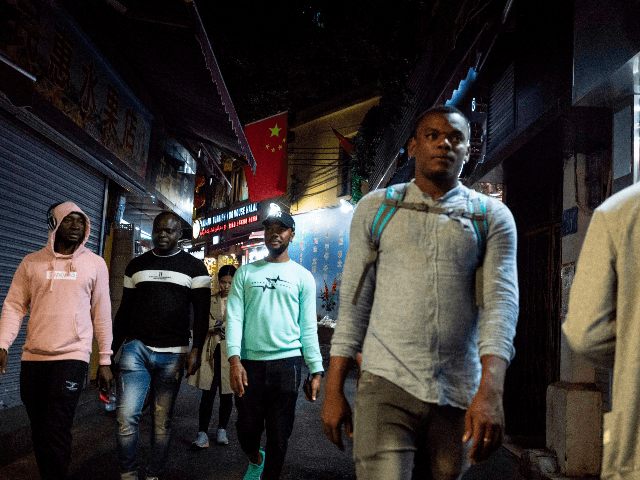China’s Global Times propaganda outlet appeared to blame Africans in Guangzhou, a southern city with a large African immigrant population, on Friday for the widely documented bigotry by Han Chinese against them there, demanding they “readjust their way of thinking.”
In a piece dismissing racism accusations against Han Chinese as “absurd,” the Times contended that China’s alleged success in combatting the Chinese coronavirus pandemic was a product of “the Chinese general public” happily complying with draconian impositions on its freedom. China is the origin nation of the virus and many reports have indicated that Beijing has misreported the number of cases and deaths nationwide, allowing it to claim a better public health record than in reality.
Unlike the Han Chinese, the dominant ethnicity in the country and likely the group the Global Times referred to as the “Chinese general public,” Africans in Guangzhou have cultural deficiencies that make it more difficult for them to fight the virus, the newspaper implied in an article claiming the Chinese communist regime is not racist.
“One reason why China has succeeded in stemming the epidemic can be found in how the Chinese general public is willing to comply with prevention and control measures,” the propaganda newspaper claimed. “Recently, friction emerged between local grass-roots prevention and control personnel and some African nationals. There are multiple reasons, including cultural differences, different understanding of the pandemic, lack of knowledge about China’s policies, language barriers, and misleading hype by some Western media outlets.”
“Some Africans in Guangzhou need to readjust their way of thinking. They are not onlookers in the face of COVID-19. Guangzhou is their second home,” the Global Times scolded. “As a part of the city, they need to respect and comply with prevention and control measures just like everyone else. Controlling pandemic is not only for the benefit of the locals but also for the expat communities, including Africans.”
The article elsewhere calls documented evidence of racism in Guangzhou “fabricated,” “absurd and nothing more than a malicious attempt to sow discord between China and African countries.”
Video reports out of Guangzhou this week revealed Africans sleeping on the ground outside after being evicted from their homes and not allowed to rent hotel rooms, despite many of them being businessmen and students who could afford to do so. Some were allowed to keep their apartments, but only if they paid double the agreed-upon rent. Restaurants in the city began posting notices that they would not serve black people – including a McDonald’s franchise that posted a notice saying no “black people” would be allowed to enter the restaurant at all. The incident embarrassed the global giant into multiple apologies and “diversity and inclusion training” for its Chinese employees at the restaurant. Other sources of race-based abuse were false accusations of carrying Chinese coronavirus; some Africans in the city said they were mandated to take multiple coronavirus tests and forced to quarantine even when the test results came back negative to avoid infecting Han Chinese. Some say they never received test results at all.
“I’ve been sleeping under the bridge for four days with no food to eat … I cannot buy food anywhere, no shops or restaurants will serve me,” Tony Mathias, an Ugandan student, told Agence France-Presse (AFP) this weekend. “We’re like beggars on the street.”
China has repeatedly dismissed the concerns of human rights observers and African officials. Following initial reports of racist policies in the city, China’s Foreign Ministry dismissed them as “misunderstandings.” Communist Party publications began circulating a rumor that a Nigerian national in the city bit a Chinese nurse in anger after being diagnosed with Chinese coronavirus, claiming it to be the source of distrust of African people among the Han Chinese.
On Friday, Foreign Ministry spokesman Zhao Lijian – the spokesman responsible for the unsubstantiated conspiracy theory that the U.S. military made the virus in a laboratory – claimed that Africans in Guangzhou are “understanding” of the situation in the city. He attributed praise of China specifically to the Nigerian foreign minister, Geoffrey Onyeama.
“We have noted that many African foreign ministers, ambassadors to China, and consuls-general in Guangzhou have shown understanding to Gunagdong’s anti-epidemic measures, acknowledged China’s prompt action to address concerns raised by the African side, and asked their nationals to comply with local anti-epidemic rules,” Zhao said. “We are convinced that the China-Africa friendship will be further cemented as we work hand in hand to overcome the virus.”

COMMENTS
Please let us know if you're having issues with commenting.